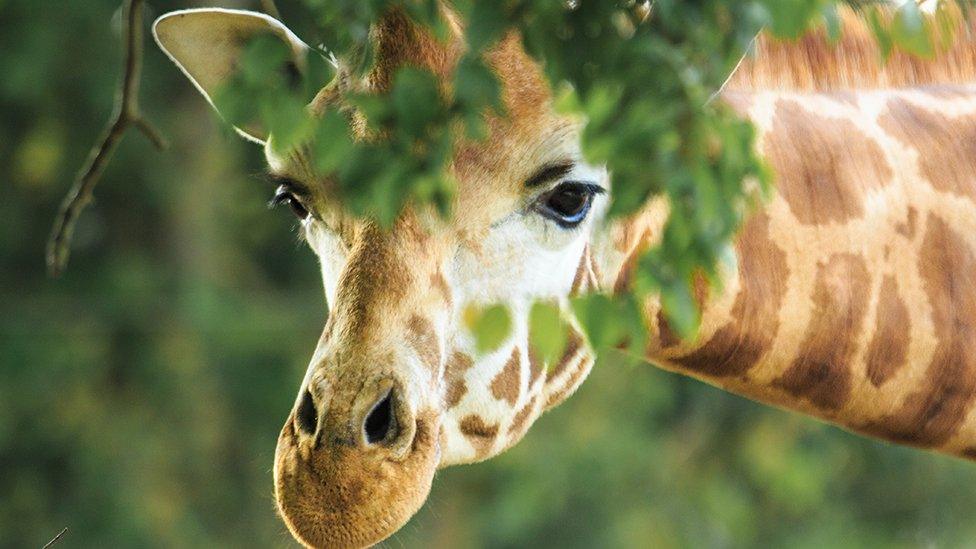London Zoo: Second Easter in lockdown looms
- Published
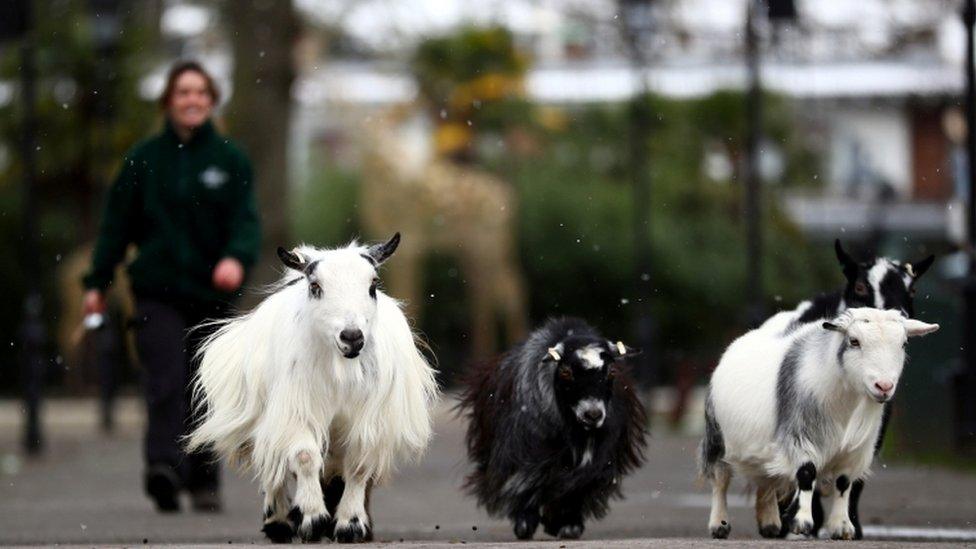
In the absence of visitors, the sociable pygmy goats have been taken to meet some of the zoo's other mammals
It's been a year of unprecedented turmoil at London Zoo, which has had to close to the public for the first time since World War Two.
Before Covid-19, the famous tourist attraction would often be bustling with visitors but during what is the third national lockdown, the zoo currently hosts very few humans.
The Zoological Society of London (ZSL) looks after 20,000 animals across two sites, the main one in Regent's Park and at Whipsnade Zoo in Bedfordshire.
ZSL relies heavily on ticket sales to fund its vital conservation work, but over the past year the charity has missed out on about £20m of income. What does the future hold for one of the world's oldest zoos?
'Asiatic lions could become extinct'
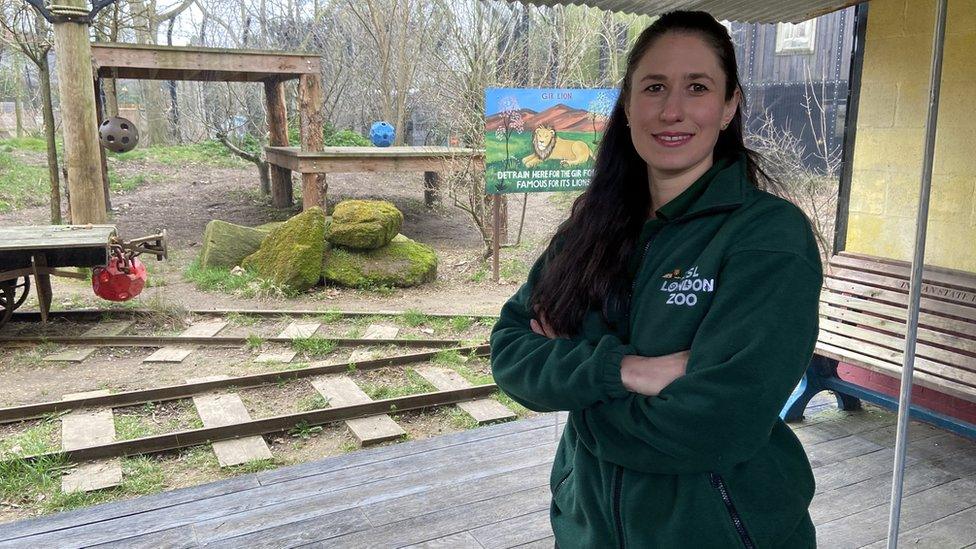
Kate Sanders says the pandemic has affected the zoo's breeding programme
Kate Sanders, who has the fearsome-sounding job title of team leader of the predator section, worries about whether London Zoo can survive.
"The last year has been a really crazy year with us being shut for the majority of the time," the 37-year-old says.
"I think we've only been open for four months over a 12-month period and it is really worrying now. What is going to happen to the zoo? What is going to happen to all the wonderful animals we work with?
"I am really worried now that if we don't start getting visitors back in, to get some money to feed these animals and look after staff, we can't survive. We are a charity who have had funds coming in from amazing people who have been donating, but realistically it is just a drop in the ocean and we do need visitors to come back."
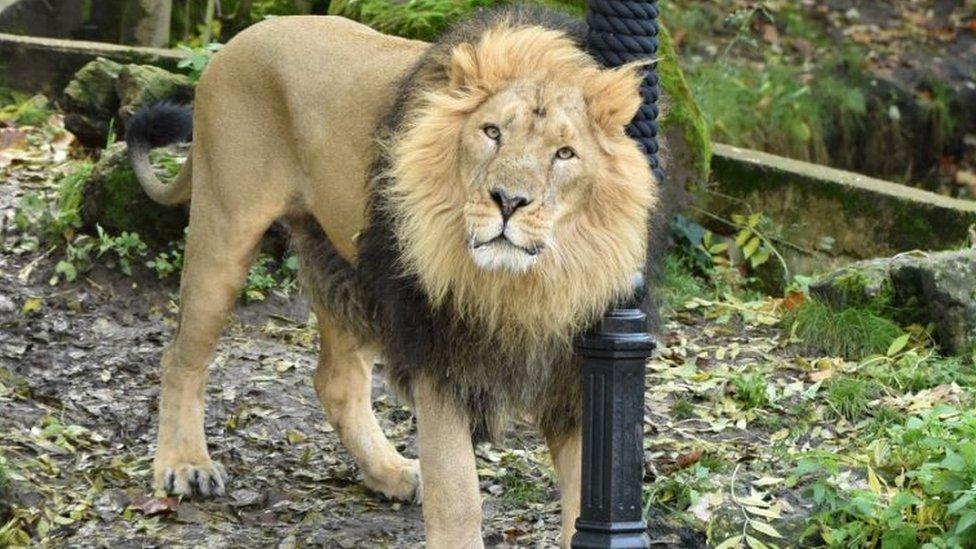
Asiatic lion Bhanu has been reluctant to mate with London Zoo's lionesses
Zoos play a crucial role in conservation. Through a worldwide network, they move endangered animals around the globe for breeding.
Ms Sanders says that in December the pandemic thwarted London Zoo's efforts to send three female Asiatic lions to Schwerin Zoo in northern Germany - the idea was to make room for a new mate for London's male lion, Bhanu.
Allow X content?
This article contains content provided by X. We ask for your permission before anything is loaded, as they may be using cookies and other technologies. You may want to read X’s cookie policy, external and privacy policy, external before accepting. To view this content choose ‘accept and continue’.
"There are not many Asiatic lions left in the wild - I think only 450 in the world now," she says. "Unfortunately, because of Covid the borders were shut for about two days between here and France, and they were meant to travel then.
"We had to stop the move as we weren't willing to take the risk that the lionesses might be on board a truck and not be able to cross the Channel to France."
The One Show recently reported that an increase in poaching has been one of the consequences of coronavirus. One of the issues is that people driven to extremes have been choosing to support themselves in this way.
"The risks are that they [Asiatic lions] might go extinct," Ms Sanders says. "That is a real possibility and no-one wants to see that."
'Animals need us whether people are coming or not'
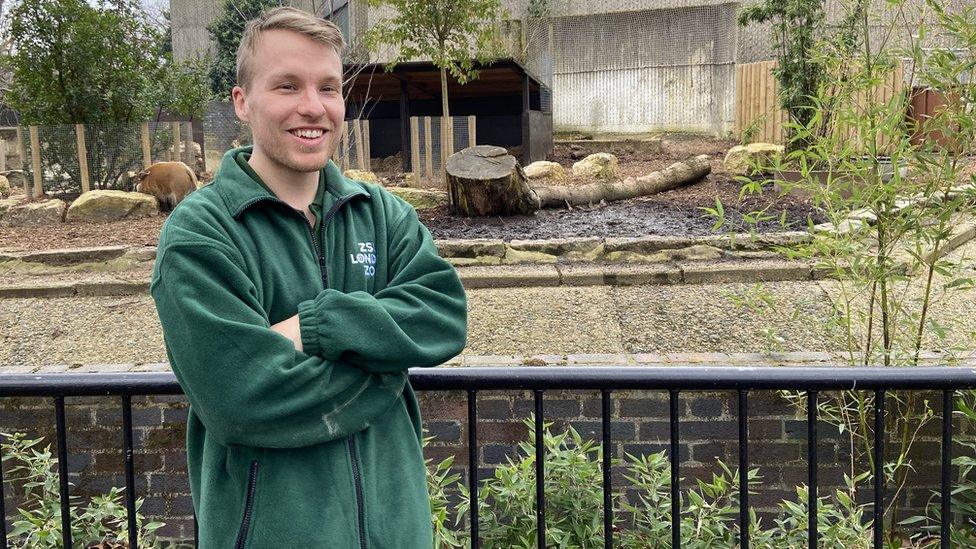
Joe Bostock-Jones says staff have had to adapt their working practices
Even the furry animals can't be furloughed, and so the zoo still needs to feed and otherwise care for them and all of its other charges.
Three times a week, supplies arrive from Covent Garden Market. A typical delivery might include 500 boxes of sweet potatoes, 3,000 cucumbers, 300 melons and 200 sweetcorn cobs.
Staff have also been pruning Regent's Park's trees and bushes to provide food for the giraffes. Feeding the animals across both ZSL sites costs about £1m a month.
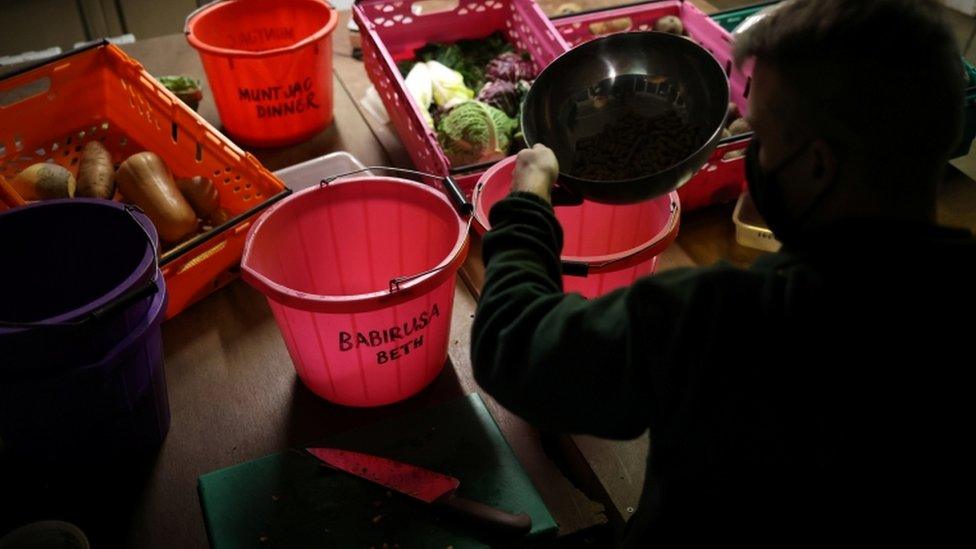
It's feeding time at the zoo
It means staff like 24-year-old Joe Bostock-Jones are still reporting for duty each day. "Animals need caring for whether people are coming or not," he says.
"It took a while for us to get used to the changes. We are quite a busy zoo, especially around March. The closure was announced on the evening [of 23 March] and the next day we were shut. I remember walking over to our mess room and it was just really weird and silent.
"At the start, we didn't think we'd be closed very long, A month or two later, it slowly dawned on us that this was going to be it for a while."
'We had to find the goats some company'
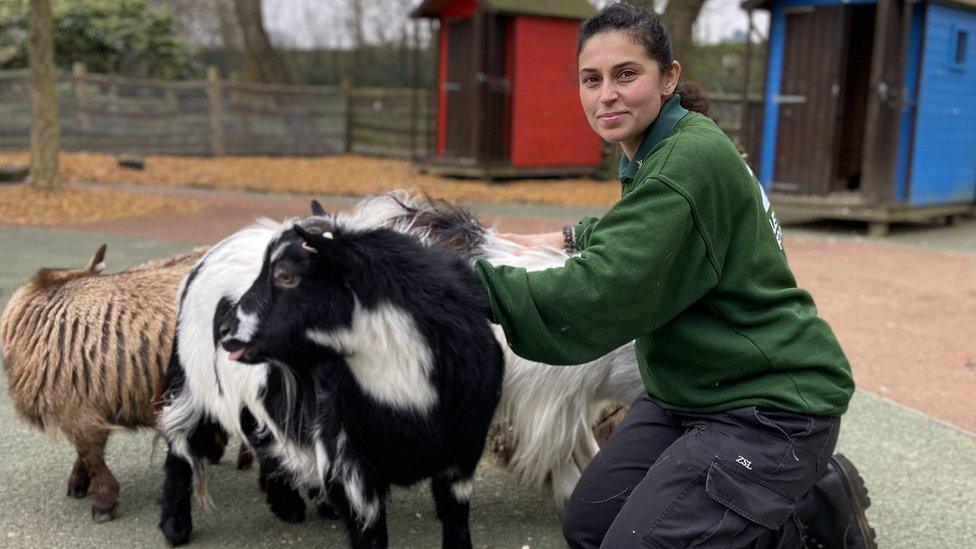
Veronica Heldt is the deputy leader of animal activities at London Zoo
While the animals are being fed as well as they were before Covid-19, Veronica Heldt, 40, says some of them have noticed the lack of visitors.
"The pygmy goats definitely miss the public during lockdown," she says. "At first they were lining up at the gate to their enclosure waiting for the public, who never turned up, meaning we had to step in."
Zookeepers take it in turns to walk the goats around the site, giving them an opportunity to interact with other animals.
"The pigs, camels and even Max the eagle owl go for walks too," says Ms Heldt, who is the zoo's deputy leader of animal activities. "It's enriching for all the animals they pass as well, and the goats even help the gardeners out with a lawn trim.
"Seeing the zoo empty of visitors is sad for us. A huge part of what we do is educating the public about animals and inspiring people from a young age to care about wildlife."
'It has been exhausting'
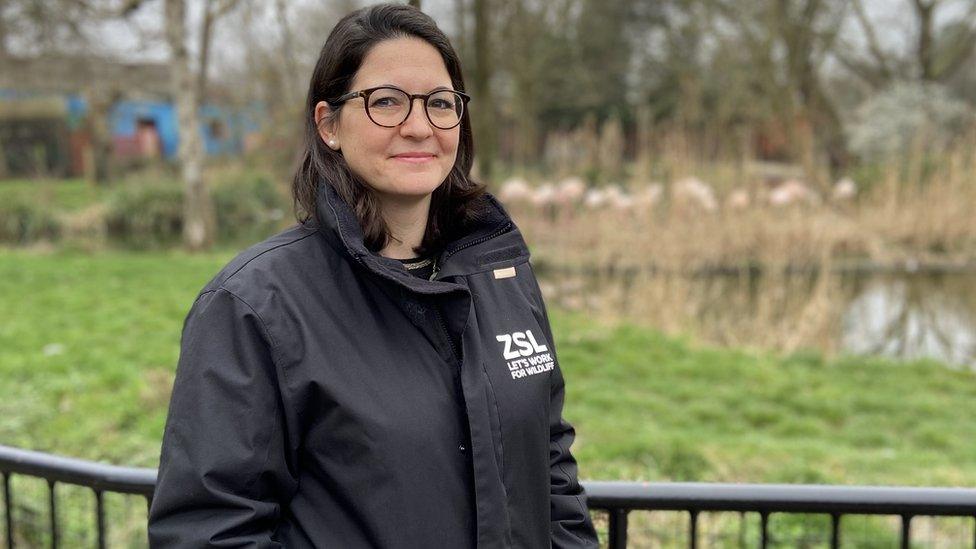
Chief operating officer Kathryn England praised the "exceptional" efforts of the public, who have donated £7m out of ZSL's £12m fundraising target
Under the government's current roadmap plan out of the third lockdown, ZSL can open its two zoos on 12 April.
That day can't come soon enough, says chief operating officer Kathryn England, although she points out that ZSL faces difficulties until then and beyond.
"We are a charity and we rely on income coming through our gates," she says.
"2020 saw us lose about £20m, which is an awful lot of money. Now, we enter 2021 and we are still closed and we see about another £6m adding on to that.
"We found ourselves closing in March last year, so that meant we have missed Easter, the May half-term, and this time round in 2021 we are closed once again at Easter.
"It has been exhausting, there is no denying that. Opening and closing a zoo is not as simple as turning a key to the front door, so there is an awful lot to think about.
"We are hopeful we can open up again shortly afterwards but that again will be with capacity limits and different ways of working, so it has a limit on the people we have through the doors."
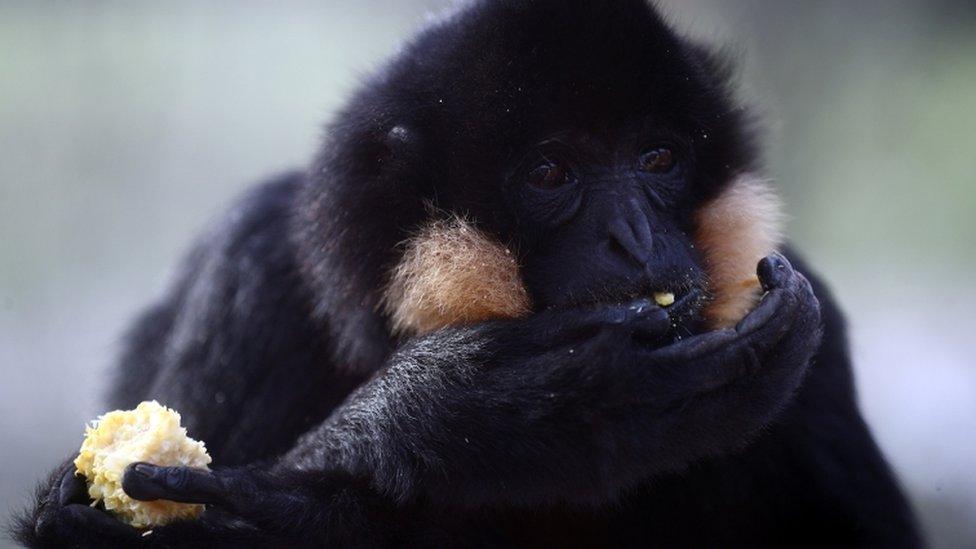
Yoda (pictured) and his father Jimmy are the only gibbons at London Zoo
Ms England admits the 12 April opening date is only a hope at this stage, as it depends on Covid infection rates.
"One thing we have all learned is that until something is nailed down in black-and-white terms, we are not going to assume anything. It is great to have a roadmap and dates to work to, but ultimately we plan around a concrete date.
"The sooner we can open, the sooner we can help ourselves and get people through the gates," she says.
"I'm sure everybody is ready for a good day out."

For more London news follow on Facebook, external, on Twitter, external, on Instagram, external and subscribe to our YouTube, external channel.
- Published17 November 2020
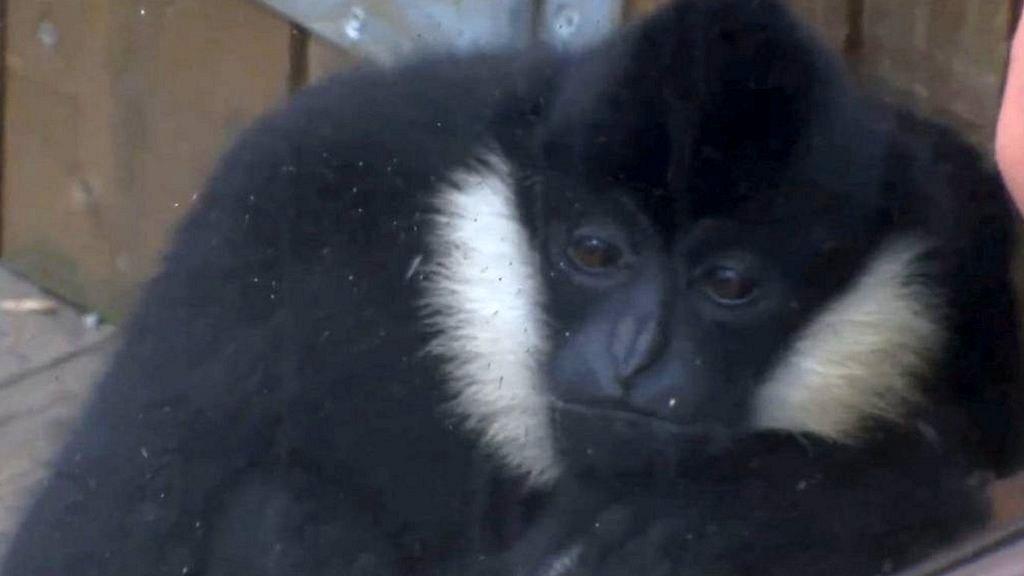
- Published1 October 2020
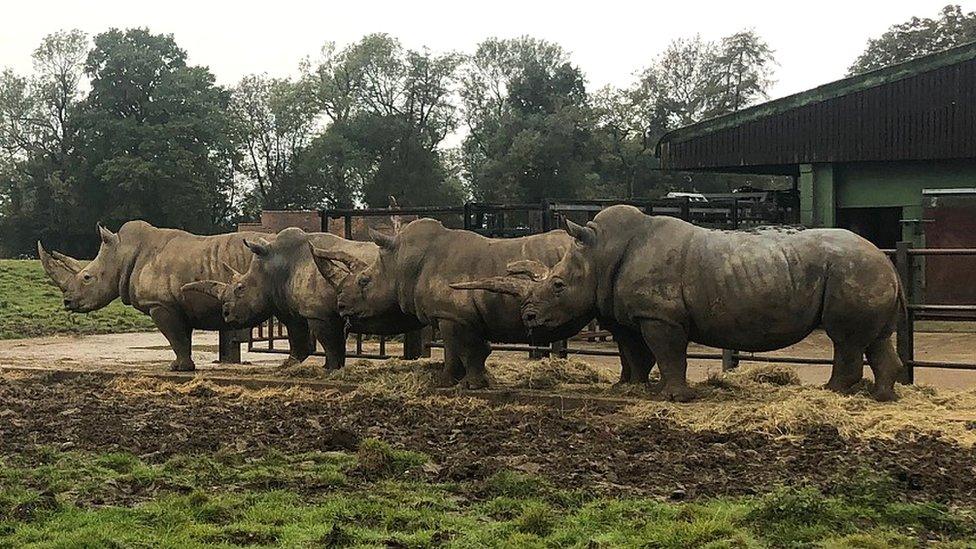
- Published9 February 2021
